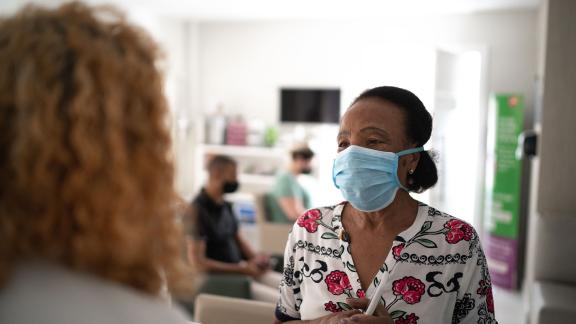Time for community services to be given resources to care for most vulnerable people

Local authorities must receive significant increases in the public health grant so that community health providers can pay their staff adequately, writes Andrew Ridley, chair of the Community Network, which was established by the NHS Confederation and NHS Providers.
This article was first published by HSJ.
Next year will be the third year of the NHS Agenda for Change pay deal. As leaders of community health services, we ought to be welcoming increased salaries – paid for in full by the government – for our valued teams, who provide essential services such as sexual health clinics and health visiting to their local communities. Instead, without clarity on how the cost of the pay award will be covered, we face an increasingly uncertain future – with significantly increased costs.
How have we got here? Agenda for Change is the nationally negotiated and mandated pay framework that applies to all NHS staff. Increases in costs negotiated nationally are then reflected in income paid to trusts through increases to the NHS tariff, so they can meet the costs of higher pay.
However, the NHS tariff does not apply to NHS services now commissioned by local authorities. There is therefore no automatic mechanism for compensating commissioners and their providers for these nationally mandated cost increases. The centre recognised this problem in 2018-19 and 2019-2020 and eventually made additional allocations to providers to enable them to honour the pay rises agreed for all staff.
Sustainable solution
As a Community Network, we continued to press for a sustainable solution that would move beyond this stopgap – and we welcomed the Spending Round’s announcement of a real terms increase to the Public Health Grant budget. However, five months on, both community service providers and colleagues in local government are still waiting to hear what that increase will be and how it will be allocated.
Now the NHS planning guidance states that “inflationary costs” associated with providing services should be “captured and priced into” contracts with non-NHS commissioners, including public health services commissioned by local authorities. It helpfully confirms the non-recurrent funding provided to the sector in 2019-20 will not be repeated.
But this approach does not reflect the reality on the ground. Many public and community health contracts are multi-year and fixed-price. We are concerned that we won’t be able to reflect these costs by renegotiating them at this point with local government colleagues. Instead, we may be forced to try to cover the full costs ourselves, adding significant additional cost pressure onto already cash-strapped but vital community services.
The planned increase in the Public Health Grant is still unknown and with growing pressures on local authority budgets, we have no reassurance that such increases would be affordable for our commissioners.
If a central solution cannot be found, there is potential for a huge impact on the services we are able to provide. In my own trust, about a fifth of our funding for 2020-21 comes from local authorities. We estimate the impact of the three-year pay award on us will be about £4 million – with a further £2.4 million linked to the change in pensions contributions that has been deferred to 2021-22.
Furthermore, there is no real framework to resolve disagreements between NHS providers and local authority commissioners if we cannot agree changes to contracts and this will only get worse beyond 2020-21, as we expect there will be further NHS pay awards beyond the current three-year deal.
But this isn’t just about finances – most importantly, it’s about people. The interim People Plan set an ambition to make the NHS the best place to work. I want it to be the best place to work for all of our colleagues – including those NHS staff who happen to work in services commissioned by local authorities. It can’t be right that they face continued uncertainty, which is bound to have a detrimental effect on staff morale, and in turn, on our already-challenged retention and recruitment.
If we are serious about recognising the vital importance of sustainable and high-quality community services, as signalled in the long-term plan, we need central government to act. Local authorities must receive significant increases in the public health grant so they can pass these funds to providers, ensuring that the commitment to fund the national agenda for change pay deal fully is honoured.
For years, public health services have been ignored and underfunded – now it looks as if they will face an even greater squeeze. It’s time for words to become actions, and for community services to be given the resources they need to care for some of the most vulnerable people in our communities.
Andrew Ridley is Chair of the Community Network, which was established by the NHS Confederation and NHS Providers, and chief executive of Central London Community Healthcare NHS Trust.



